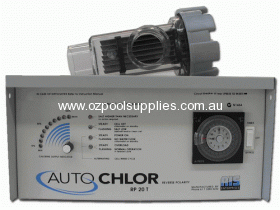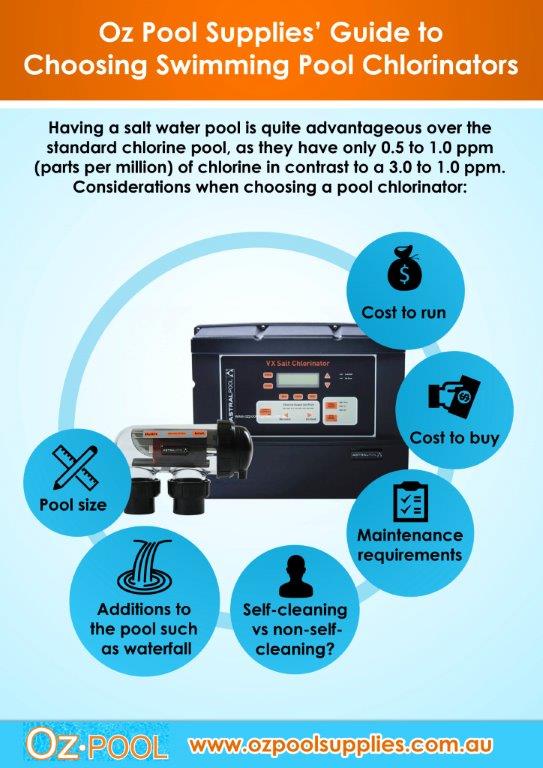We are here to help! Call us on 1800 642 688
Categories
Best Sellers
Oz Pool Supplies’ Guide to Choosing Swimming Pool Chlorinators
Oz Pool Supplies’ Guide to Choosing Swimming Pool Chlorinators
 Having a salt water pool is quite advantageous rather than the standard chlorine pool, as they have only 0.5 to 1.0 ppm (parts per million) of chlorine in contrast to a 3.0 to 1.0 ppm, not to mention the added chemicals used to prevent algae.
Having a salt water pool is quite advantageous rather than the standard chlorine pool, as they have only 0.5 to 1.0 ppm (parts per million) of chlorine in contrast to a 3.0 to 1.0 ppm, not to mention the added chemicals used to prevent algae.
The salt cell of a salt water chlorinator is the main active part in how the system works. It is a chamber with plates that are electronically charged oppositely, similar to magnets. When salt is added into the system, it flows between the plates, reducing the opposite charge and in doing so, converting some salt into chlorine. This produces chlorine in a much cleaner fashion than buying bags of it, and in having such clean production, the incidence of algae is reduced and germs and bacteria in the pool are wiped out.
There are many different types of swimming pool chlorinators on the market, among them being the Davey, Autochlor, Zodiac, Hurlcon and Onga salt water pool chlorinators. When looking at the different systems, not only should you be looking for the best performance and least cost, but for the one that will suit your pool the best. If this is an issue for you, consult the team at Oz Pool Supplies for information.
Davey and Hurlcon salt water chlorinators have no set price, so contact Oz Pool Supplies for costs for your pool. Autochlor has a large range of salt water chlorinators and price ranges, starting at a small, non-self cleaning system with no timer at $475, and ending at a large self cleaning system with a battery backed up timer at $1,345. Zodiac has two main styles of salt water chlorinators, Ei and Tri. Ei is cheaper, easier to install, operate and maintain, and costs anywhere from $565 to $625. The Tri system is more customised, starting from $699 for a compact system. For larger sizes a quote is needed depending on the pool. Onga Pentair Water systems range from $679 to $899, also depending on size.
Hurlcon salt water chlorinators have no set price, so contact Oz Pool Supplies for costs for your pool. Autochlor has a large range of salt water chlorinators and price ranges, starting at a small, non-self cleaning system with no timer at $475, and ending at a large self cleaning system with a battery backed up timer at $1,345. Zodiac has two main styles of salt water chlorinators, Ei and Tri. Ei is cheaper, easier to install, operate and maintain, and costs anywhere from $565 to $625. The Tri system is more customised, starting from $699 for a compact system. For larger sizes a quote is needed depending on the pool. Onga Pentair Water systems range from $679 to $899, also depending on size.
The lifespan of any of these systems generally relies on their upkeep. A well maintained salt water cell can last anywhere from three to seven years, and after that should be replaced. To avoid replacing too soon do not clean too frequently or improperly. Consult your supplier about proper maintenance when you buy the system, but generally once a season is what is required. The control board of the system has the same lifespan, but this varies regardless of maintenance.
Making the decision of which salt water chlorinator to buy is a big deal and many things must be taken into perspective. It must be compatible with your pool, produce enough chlorine for your pool to function normally and fit your budget. Choosing the correct one can change the quality of your pool and will give you a better alternative to the harsh chemicals used to balance the standard chlorinated pool. Ask us if you need assistance.




